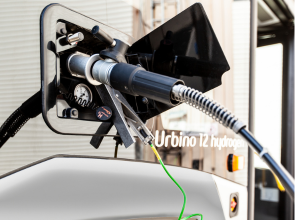Hydra Energy to develop hydrogen station for trucks
Hydra’s Prince George station will be operational in early 2024.

Hydra Energy has broken ground on the world’s largest hydrogen refuelling station in Prince George, British Columbia, Canada.
This marks the first project in the company’s Western Canadian Hydrogen Corridor servicing BC- and Alberta-based heavy-duty trucks that have been converted to run on both hydrogen and diesel using Hydra’s zero-cost, co-combustion conversion kits. This includes Hydra’s first paying fleet customer, Prince George-based Dymin Mechanical, whose fleet will represent 12 of the 65 trucks the new station will support.
The new station and hydrogen production will be located on five acres, produce 3,250 kilograms of hydrogen a day, and refuel as quickly as diesel and up to 24 Hydra-converted trucks each hour across four bays. The station’s low-carbon hydrogen is being produced from two on-site, 5-megawatt electrolysers with electricity coming from BC Hydro, BC’s main electricity utility with 31 hydroelectric facilities throughout the province.
Additional critical partners include energy project delivery expert Solaris, and industrial construction specialist, PCL Construction, with project financing support coming from Hydra’s seed funders and non-dilutive government funding, including the BC Ministry of Energy, Mines and Low Carbon Innovation – Part 3 Agreement.
The company is also partnering with the Edmonton International Airport (EIA) to build a similar project on EIA land. This will service Hydra-converted trucks in the Edmonton region (like Hydra’s second fleet customer, VEXSL), marking the Eastern-most endpoint of Hydra’s Western Canadian Hydrogen Corridor on Highway 16. Additionally, another station is being explored along the same highway in Port Edward/Prince Rupert located west of Prince George.
Hydra’s CEO, Jessica Verhagen, added, “We’re grateful for the support of the Prince George community since the region is a perfect place to demonstrate our proprietary hydrogen conversion technology due to its cold weather, challenging terrain, and the heavy payloads common in the area.”
Ilya Radetski, Hydra Energy Service Delivery Lead, said, “This Prince George station demonstrates that hydrogen can be provided at diesel parity without up-front capital costs for fleets.”
Bruce Ralston, B.C. Minister of Energy, Mines and Low Carbon Innovation, said, “Hydra continues to crack the most difficult-to-decarbonise sector – heavy-duty trucking, which accounts for just over 1% of vehicles on Canadian roads but 30% of total GHG emissions.”
Avi Salh, Solaris Principal Consultant, commented, “It takes a strong team and an integrated supply chain to establish novel projects like this.”
